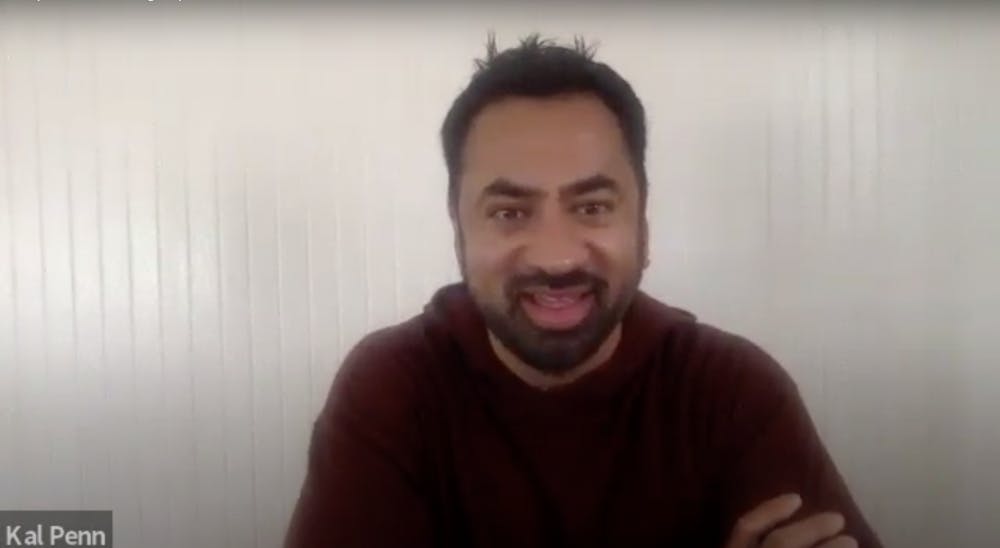Actor, writer, producer and former Associate Director of the White House Office of Public Engagement Kal Penn discussed his career and experience working in the entertainment industry as the son of South Asian immigrants on Monday in an event moderated by School of Communication professor Priya Doshi.
The event, hosted by the Kennedy Political Union, was held in a hybrid Zoom format, with an in-person viewing in the School of International Service Founders Room. It was the organization’s final event of the semester, as well as its final event under the leadership of its current director, Sonali Doshi.
“I am South Asian so it was really important to me to bring some South Asian representation to campus during my time as KPU director,” Sonali Doshi said.
Priya Doshi, who moderated the event, is SOC’s former Diversity and Inclusion Officer and has over 20 years of experience in multicultural and strategic communication. She grew up in the same New Jersey county and South Asian community as Penn.
Discussion centered around South Asian identity and Penn’s experiences in entertainment and politics. As an actor, Penn is known for his roles in the “Harold and Kumar” franchise, as well as TV shows such as “Designated Survivor” and “House.” He volunteered for former president Barack Obama’s campaign in its early stages, and went on to become associate director of the White House Office of Public Engagement in Obama’s administration. In 2020, Penn published a memoir titled “You Can’t Be Serious.”
Penn said he has always been drawn to storytelling and humor.
“You add this opportunity to understand people’s life experience through the universality of laughter,” Penn said.
Penn said his acting career began in middle school, where he played the Tin Man in his school’s production of “The Wizard of Oz.” He went on to attend a high school with a magnet program for the arts and then studied film and sociology at the University of California Los Angeles.
“I’m a son of immigrants who did not move to America for their son to do stoner movies,” Penn said, explaining that he grew up hearing from family and community members that South Asian children should strive to attend the highest-tier institutions and go on to careers in fields like medicine, engineering and law.
While he was writing his book, Penn said, he had called his parents and asked them, on a scale of one to ten, how embarrassed they had been when he decided to study film at UCLA. Their answer surprised him, he said.
Penn said his parents told him they were not “embarrassed,” but they were “scared” he would not be successful, since there was hardly any representation for South Asians in Hollywood.
He said in the beginning of his acting career he had often faced what he called “the brown catch-22.” In order to audition for roles other than the ones that were stereotypically South Asian, he had to have experience, but in order to have that experience, he had to audition for roles that were stereotypically “brown.”
However, Penn explained, this taught him that he could have artistic liberty and input. After accepting a role playing a character named “Taj Mahal,” he met with the producers and asked for changes to the script. Although not every change was accepted, he said “understanding that as an artist you can have creative conversations” was a valuable lesson.
“Every plotline should not be about the Indian experience,” Penn said, and pointed out that he had played characters where this identity was not central. Yet, he said, the authenticity of characters was subjective and the capacity to influence it was one that required a certain privilege. He emphasized that no one group should act as an “arbiter of identity,” and that labeling someone as a “sellout” could imply privilege.
He also discussed his roles in TV and film. He said he almost had not taken the role in “Designated Survivor,” but was ultimately convinced when he heard it was a thriller conspiracy show.
“If I was an airline mechanic in real life [it was as if] I then did a Broadway play where I was a flight attendant,” he said, when asked how his role in “Designated Survivor,” where he played White House communications director Seth Wright, compared to his actual work in the White House, where he focused on youth outreach in his position in the Office of Public Engagement.
As the event came to a close, Penn took questions from student audience members, who asked about South Asian representation, how to resist the urge to assimilate in predominantly white industries and spaces and the political causes he was most passionate about.
“In an ideal world, everything makes us a little more informed,” said Penn of the intersection between entertainment media and politics.
He concluded with the advice that having uncomfortable conversations with those with whom it is the most difficult, namely loved ones, makes it easier to be compelling in other situations, when the stakes are not as high.





